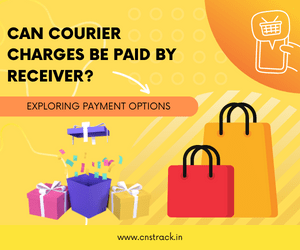Can Courier Charges Be Paid by Receiver: When it comes to shipping packages, there’s often a question of who bears the cost of courier charges. While the sender traditionally pays for shipping, there are situations where the recipient covers the expenses.
This arrangement is known as receiver-paid courier charges, and it has its own set of advantages and considerations. In this blog post, we’ll delve into the concept of receiver-paid charges and explore the factors to consider when choosing this option.
What are Receiver-Paid Courier Charges?
Receiver-paid courier charges refer to a shipping arrangement where the recipient of a package assumes responsibility for the shipping costs instead of the sender. This can be particularly useful in certain scenarios, such as when a sender wants to provide a gift to someone without burdening them with shipping expenses.
Benefits of Receiver-Paid Courier Charges:
1. Convenience for the Recipient: By opting for receiver-paid charges, the sender can ensure that the recipient doesn’t have to worry about any shipping-related expenses. This can be especially thoughtful when sending gifts or packages to family, friends, or clients.
2. Cost Management for the Sender: For businesses or individuals sending multiple packages, allowing recipients to pay for shipping can help manage costs, particularly when the sender wants to extend a gesture without incurring additional expenses.
3. Global Deliveries: In international shipping, receiver-paid charges can be beneficial as they help avoid currency conversion fees and ensure that the recipient knows the exact cost they need to cover upon delivery.
4. Personalized Shipments: Receiver-paid charges can be used to offer a personalized experience. The recipient can choose their preferred shipping method or speed, tailoring the delivery to their convenience.
Considerations for Sender and Recipient:
1. Recipient’s Consent: Before opting for receiver-paid charges, it’s essential to inform the recipient about the arrangement and gain their consent. Unexpected charges might lead to confusion or refusal of delivery.
2. Transparency: The sender should clearly communicate the shipping costs to the recipient upfront. This helps the recipient make an informed decision and prevents any surprises upon delivery.
3. Tracking and Accountability: Both the sender and the recipient should ensure that the chosen courier service offers reliable tracking and accountability. This prevents disputes regarding delivery status or charges.
4. Cultural Considerations: In some cultures, it might be considered impolite or unusual for the recipient to cover shipping costs. It’s important to consider cultural norms when choosing this option.
5. Payment Methods: The recipient should have access to suitable payment methods to cover the courier charges upon delivery. This includes cash, credit card, or any other accepted form of payment.
FAQ
Can courier charges be paid by the receiver USPS?
Can courier charges be paid by the receiver in India?
Can courier charges be paid by the receiver internationally?
Why would I have to pay to receive a package?
Receiver pays for shipping DHL?
Money inside the parcel?
Do I need to pay money if I receive a parcel from abroad in India?
Can the receiver pay for postage?
Remember, the ability to pay for courier charges upon delivery, customs regulations, and other fees can vary based on the courier service, the country’s regulations, and the specific terms of the shipment. Always communicate with the courier company and understand the terms before sending or receiving a package.
